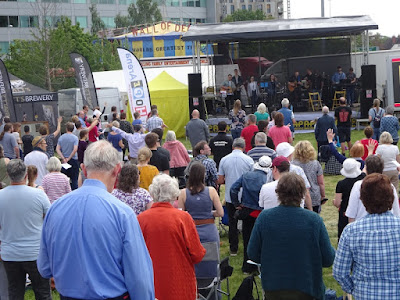Singers Hill Synagogue is home to the city’s Hebrew Congregation and has been the focal point for Jewish worship and community life in Birmingham for 159 years. I’ve been keen to visit this intriguing building since starting my blog.
The pictures of the interior show a beautiful setting steadfastly holding its place as high-rise blocks and thundering ring roads spring up all around it.
The pictures of the interior show a beautiful setting steadfastly holding its place as high-rise blocks and thundering ring roads spring up all around it.
Sadly, the pictures on the website and a view of the entrance through high, black railings are all I’m likely to get. I won’t be going in.
The signs were not good from the start, it has to be said. I emailed on more than one occasion to ask about joining a service. I got no reply or acknowledgment. I rang the office but was told it was closed.
The church family has - as a sweeping generalisation - not really mastered the full online communication experience yet. I’ve signed up with dozens of churches offering to keep me updated and received next to nothing so far. And as for contacting numerous churches, vicars, mosque offices and more than one Rabbi, through their websites - all I can say is that I hope God answers your prayers a lot more efficiently than you answer your emails.
 On arriving this morning I find the building locked up and closed off only minutes from the published start of the service. I’m peering through the rails at the closed doors when a high-vis jacketed man I genuinely took to be one of the city’s army of traffic wardens, asks me what I’m doing.
On arriving this morning I find the building locked up and closed off only minutes from the published start of the service. I’m peering through the rails at the closed doors when a high-vis jacketed man I genuinely took to be one of the city’s army of traffic wardens, asks me what I’m doing.
I explain what I’m here for but he’s already decided I’m not going in. I should have emailed or telephoned, he says. I tell him I did but I don’t get the impression my answer fits what he wants to think. A succession of people pass through all shrugging sympathy but the gates stay locked with the only way in for everyone a keypad controlled gate under the control of the security man.
The Rabbi arrives and, although he is polite and understanding, I am not to be allowed in. I try explaining why I’m here, how I’ve made an effort to get here, what my expectations were and so on. He goes so far as to say that I seem like a genuine person to him - well that’s a blessing of sorts - but that he is not able to help as nobody is allowed in unless they have registered and been cleared by the central authority. He tells me I should email him.
The security man offers the view that the very fact he needs to be there at all is a sad comment on the world we live in these days. He seems to want to offer a lots of comments. I make the observation that the impotency of a church leader to allow someone to come into his place of worship is a far sadder indictment. The Rabbi looks uncomfortable at this.
 We’ve all come across the ‘It’s not my fault mate, it’s head office’ excuse before. I’ve encountered it from shop staff, call centre operatives, train companies and more. But never from a church.
We’ve all come across the ‘It’s not my fault mate, it’s head office’ excuse before. I’ve encountered it from shop staff, call centre operatives, train companies and more. But never from a church.
I would have liked to ask the Rabbi what would happen if someone knocked at the door of his Synagogue in genuine peril and desperate for his help. As a patient, and no doubt learned man, I’m sure he’d have an answer, but I’m left feeling my question would have had to get passed one high-vis sentinel and a distinctly unresponsive head office before it would reach him.
The purpose of my visits has never been to judge any particular religion or congregation. I try to come with an open mind, see what goes on and try to pick out what lessons I can learn.
But in being shown that there is literally no place for me here, am I not being shown with abundant clarity a lesson in the difference between the generosity of welcoming the world with all its faults and risks, and the mean-spiritedness of literally closing the door in that world’s face?
These are troubling times for many churches. They can attract criticism, abuse and occasional violent action. But on this pilgrimage I’ve been struck by the constant theme of opening up and welcoming all people regardless of their background. I’ve been made to feel at home almost everywhere I’ve been and, perhaps naively, allowed that to become my blanket expectation.
I may email the Rabbi and make a second attempt to join the worshippers here, but I’m not minded to do so at the moment.
Contenting myself with a stroll to the art gallery and the bookshop before getting back on the train, I’m drawn into a conversation with a Muslim man at a stall offering information to the crowded shopping streets of the city. I ask him if he’s worried about being picked on or attacked. He says it’s part of his faith to stand up to challenges in trying to further understanding and spread a message of peace. He gives me a handshake, a huge smile and a free copy of the Quran.

























